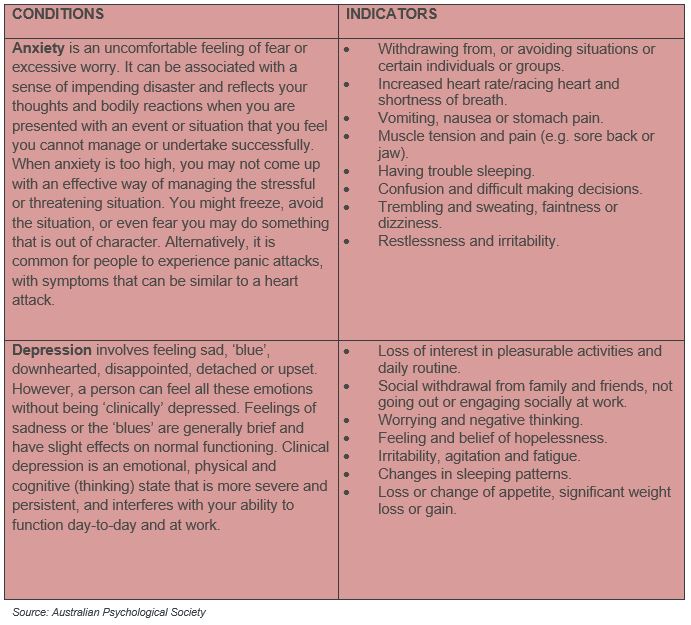What is work stress? Recognising the early warning signs and tips to help you ensure a mentally healthy workplace.
What is mental health?
When we talk about mental health it is often taken to refer only to mental health disorders (e.g., major depressive disorder or an anxiety disorder). But mental health actually refers to how well a person is in their thinking, managing their emotions, relating to others, and generally meeting the demands of everyday life and employment. In other words, it is a continuum, with one end marked by mental health disorders, progressing to functioning without mental health symptoms, and then through to a state of wellbeing – where an individual is thriving. At the wellbeing end of the continuum, they are engaged successfully in their personal life and work, have rich social interactions, experience a sense of enjoyment and contribute to their community.
Why is mental health important in the workplace?
Workplaces depend on workers’ thinking abilities and interactions with other people. How well a person performs in a team, relates to a customer or deals with daily challenges – all have to do with their state of mental health or wellbeing.
It is no surprise therefore that positive links have been found between the health and wellbeing of employees and productivity and performance. When people are unwell mentally, it costs businesses through sick leave, backfilling positions, lower productivity, staff turnover, and even possibly workers’ compensation claims.
In addition, work is so important for most people because of the amount of time they spend there and it is such a big part of who they are and how it enables them to live, learn and grow. Work itself therefore has a potential impact on people’s mental health – the way it is organised, how people are managed and how well the work environment functions. Generally, healthy work has a positive impact on people’s mental health and wellbeing. The mental health of people engaged in work is up to four times better than people experiencing ongoing unemployment.
It is important therefore for all managers to be aware of the role that everyone’s mental health plays in influencing overall workplace performance and to protect employees mental health at work and promote positive wellbeing.
How common are mental health disorders?
It is estimated that, at any time in Australia, 1 in 5 working age people will be suffering from a diagnosable mental health disorder. A further similar proportion of the population will be suffering from various mental health issues (such as worry, fatigue, sleep problems) which although not meeting criteria for a diagnosed condition will be affecting their ability at work.
It is helpful that everyone is aware of the various early warning signs that help identify potential issues so that managers and co-workers can appropriately help and support someone who may be experiencing a mental health issue.
Mental Health Early Warning signs
Changes in someone’s usual behaviour are often signs that there could be a mental health issue that the person is experiencing. Some common mental health indicators include:
- Increased absence from work/unplanned leave
- Lowered concentration e.g. not being able to make decisions or not being able to focus on tasks
- Reduced motivation
- Decreased personal care
- Lower performance or problem solving ability
- Irritability or signs of aggression
- Reacting with unusually high emotion
- Feeling sad or anxious regularly
- Disconnecting or withdrawing from others
- Increased use of nicotine, alcohol and caffeine
The most common mental health conditions are anxiety and depression. Their descriptions and associated indicators are shown below

What is work stress?
Stress is sometimes confused with anxiety but it is a not a mental illness. It is a state of physical and mental tension, a kind of state of readiness to respond to situations that may be overwhelming or threatening us, either at work or in our personal lives. If it is thought of as “pressure” then, within limits it can have a positive impact. For example, if one experiences too little demand or pressure, then they may not be motivated enough. Just enough pressure e.g. through having a reasonable deadline or needing to learn new skills means that we can grow and have a sense of fulfilment.
At work, stress, however, is typically referred to as a negative state of being overwhelmed. Often when people are experiencing work stress their performance deteriorates. If it is experienced for a prolonged period it may show up as one or more of the indicators described above, and then even lead to other diagnosable mental health conditions. It is therefore also beneficial to businesses to manage the risk of work stress.
What can you do for mental health at work?
The majority of mental illness that is experienced in the workplace is treatable and sometimes preventable. Employers have a role to play in maintaining the health and wellbeing of their workers as well as in assisting in their recovery.
Here are some suggestions for action in the workplace:
- Talk about mental health openly to reduce the stigma sometimes associated with mental illness
- Demonstrate a visible, active commitment to mental health in the workplace so that people feel safe to talk about mental health in the workplace
- Make improving mental health a key objective of your business, following it with practical action plans
- Treat mental health the same as you would physical health in all your health and safety initiatives and business decisions
- Provide flexible options for those returning to work after absence due to mental illness
- Provide a healthy physical work environment, e.g. light, noise, ergonomically designed tools of trade
- Provide access to mental health support services for individual employees who require short term help
- Identify and support champions to promote workplace mental health initiatives
- Provide wellbeing learning programs with a focus on stress management and building resilience
- Support various health related initiatives, e.g. good nutrition and exercise
Kasperczyk, R and Cotton, P, 2018
WorkSafe Victoria Understanding Mental Health in the Workplace Tipsheet.
This tipsheet is intended for general use only and may not be applicable in every circumstance. You should always check any applicable legislation and make your own judgement about what action you may need to take to ensure you have complied with the law. Accordingly, WorkSafe or Harvest cannot be held responsible and extends no warranties as to the suitability of the information for any particular purpose; or actions taken by third parties as a result of information contained in the tipsheet.

